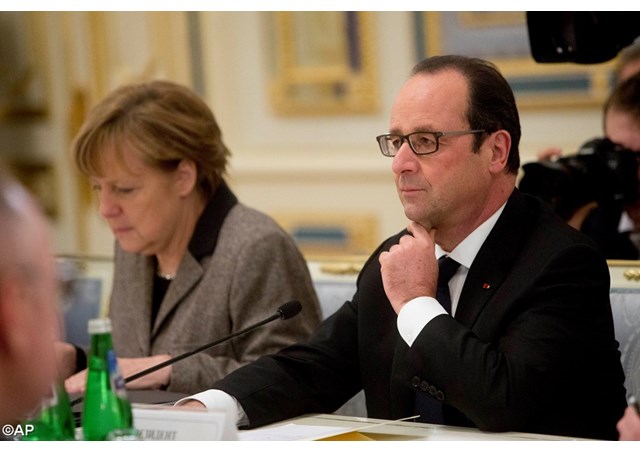
French, German leaders seeking Ukraine peace in Moscow

(Vatican Radio) French President Francois Holland and German Chancellor Angela Merkel are holding talks in Moscow to try to end escalating fighting in east Ukraine, carrying a peace plan that reportedly incorporates proposals from Russia.
Their meeting with Russian President Vladimir Putin follows urgent talks in Kiev, where U.S. Secretary of State John Kerry did not rule out delivering weapons to Ukraine's government forces fighting pro-Russian separatists.
Listen to this report by Stefan Bos
Western diplomats said Hollande and Merkel took a repackaged peace plan with them to Moscow that drops the most objectionable elements of a Russian initiative to fit what both Ukraine and Europeans want.
The plan reportedly includes some autonomy for eastern Ukraine with special protections for the Russian language, culture and local taxes.
The French and German leaders meet Russian President Vladimir Putin after they were welcomed in Kiev by Ukraine's President Petro Poroshenko. "I really appreciate you accepted my invitation and made a decision to come in a very urgent time," he told the French and German leaders.
He earlier held talks with U.S. Secretary of State Kerry at a time when pro-Russian separatists have launched a major offensive in the east.
Kerry, who brought 16.4 million dollars in humanitarian aid to Ukraine, did not rule out the possibility of providing defensive weapons to Ukraine, and said President Barack Obama was reviewing his options.
Yet Kerry also made clear that the U.S. was not interested in a proxy war. “We want a diplomatic solution, but we cannot close our eyes to tanks that are crossing the border from Russia and coming into Ukraine," he said.
"We can’t close our eyes to Russian fighters in unmarked uniforms crossing the border and leading individual companies of so-called separatists in battle.”
President Poroshenko suggested however there is little time left to find a peaceful solution as heavily armed pro-Russian rebels take over more territory. "We are facing another growing escalation of violence by terrorists directly supporting by Moscow, their refusal to fulfill [the] obligation of the Minsk [peace] agreement, their barbarian attack on the civilian population, which led to multiple casualties every
day," he added.
Yet, divisions remain within the NATO military alliance and the European Union over whether to deliver weapons to Ukraine.
Germany and other European nations fiercely oppose more arms for Ukrainian forces amid fears in nearby countries the conflict will spread.
In Brussels, NATO-Secretary General Jens Stoltenberg has confirmed that the group's defense ministers boosted the alliance's Response Force from 13000 to 30000 in reaction to Russian actions in Ukraine and to Islamic extremism.
NATO will also form a quick reaction force of 5,000 ground troops and command and control centers in six east European nations.
| All the contents on this site are copyrighted ©. |


